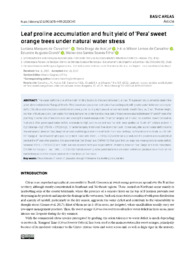Leaf proline accumulation and fruit yield of ?Pera? sweet orange trees under natural water stress.
Leaf proline accumulation and fruit yield of ?Pera? sweet orange trees under natural water stress.
Author(s): CARVALHO, L. M. de; STELA BRAGA DE ARAÚJO; CARVALHO, H. W. L. de; GIRARDI, E. A.; SOARES FILHO, W. dos S.
Summary: he water deficit is one of the main limiting factors to the yield of sweet oranges. The present study aimed to determine alternative rootstocks to ?Rangpur? lime for ?Pera? sweet oranges grown on tropical hardsetting soils with greater potential tolerance to water deficit. Six citrus scion/rootstock combinations were grown during eight years in an orchard established in Sergipe, Brazil. The tree height, number of fruits per plant, cumulated fruit yield, leaf proline content and survival rate of trees were evaluated between 6th and 8th year after planting. Greater rate of tree loss occurred among the sweet orange onto ?Orlando? tangelo, which also induced the lowest cumulative fruit yield. After prolonged water deficit, moderate to high proline content was found in trees grafted on Sunki of Florida mandarin × C13 citrange ? 012° (TSKFL × CTC13-012), ?Orlando? tangelo, ?Indio? and ?Riverside? citrandarin. Conversely, after a short water deficit during the wet season, trees on ?San Diego? citrandarin and Rangpur lime clone of Centro Nacional de Pesquisa Mandioca e Fruticultura ? CNPMF 03 ?Rangpur? lime showed higher proline content. Trees onto TSKFL × CTC13-012 and ?Indio? also induced the greatest accumulated fruit yield at the 8th year after planting. It is assumed that ?San Diego? and CNPMF 03 ?Rangpur? induce response more quickly to water deficit, whereas TSKFL × CTC13-012 and ?Indio? are less susceptible to prolonged deficit. Therefore, trees on ?San Diego? and Indio citrandarin, CNPMF-03 ?Rangpur? lime, TSKFL × CTC13-012 hybrid present greater potential to tolerate water deficit and produce more fruits on the hardsetting soils of the coastal tablelands of the Brazilian Northeast.
Publication year: 2021
Types of publication: Journal article
Keywords: Laranja
Observation
Some of Embrapa's publications are published as ePub files. To read them, use or download one of the following free software options to your computer or mobile device. Android: Google Play Books; IOS: iBooks; Windows and Linux: Calibre.
Access other publications
Access the Agricultural Research Database (BDPA) to consult Embrapa's full library collection and records.
Visit Embrapa Bookstore to purchase books and other publications sold by Embrapa.

